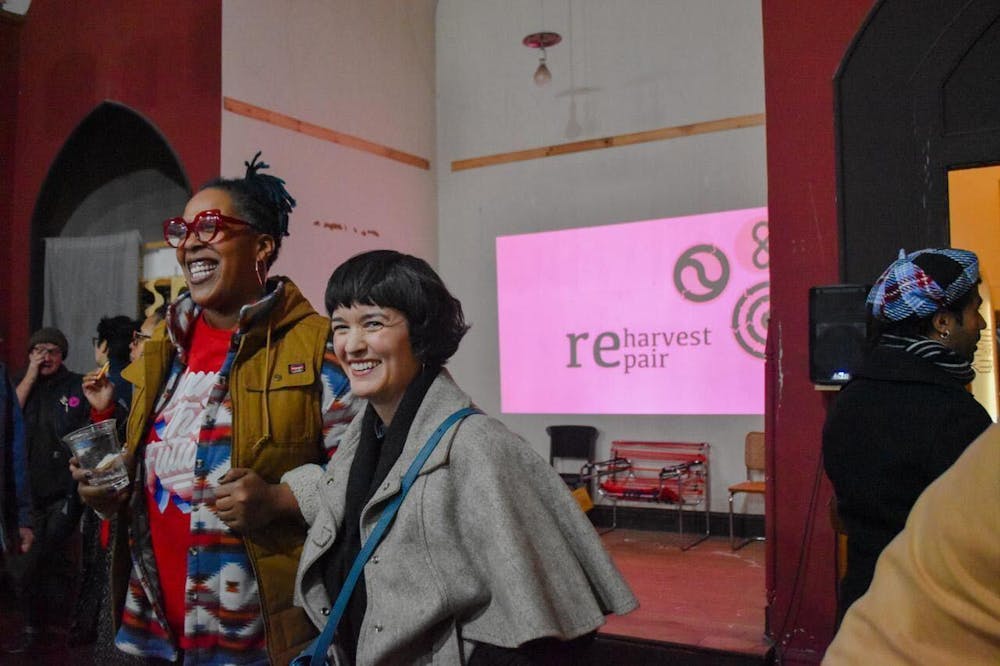Discombobulated chairs displayed on the walls of a converted church, abstract contraptions made from upcycled wood and the energetic chatter of passionate artists, designers and community members — this was the atmosphere of the Repair Atelier during the Rhode Island School of Design’s Reharvest-Repair’s Thursday launch event.
Led by RISD professors Ayako Maruyama and Markus Berger, Reharvest-Repair aims to bring newness to waste — materials they say are typically looked down upon in a consumer culture.
The project has two connected components: “re-harvest” and “re-pair.” Re-harvest involves identifying, observing and data-mapping Rhode Island’s “linear economy,” where resources are extracted to make products that are meant to be thrown away. The process follows the pipeline from production to landfill, Maruyama explained.
Re-pair attempts to shift the perception of waste, value and human-to-nature relationships through collaboration with students, institutions and community partners, Berger said. The two components aim to push the state from a linear economy — where resources are extracted to make products that are meant to be thrown away — in favor of a “circular economy,” where goods are repurposed after their initial use.

Reharvest-Repair receives funding from the Somerson Sustainability Innovation Fund, or SSIF, a grant opportunity that gives RISD researchers up to $25,000 for sustainability-related projects.
Soul Brown, RISD’s director of research, said that the grant’s namesake, former RISD President Rosanne Somerson, is well-known for embedding sustainability in her art practices.
In 2023, Viola Tan was awarded the SSIF grant for her project on housing justice and landlord-tenant relationships. Her work culminated in an interactive installation that visualized corporate landlord networks in Massachusetts. The grant covered everything from material costs to stipends for staff members of nonprofits that she collaborated with.
Avantika Velho, a RISD alum, used SSIF funding to launch a series of natural water detoxifiers dubbed BioPods. The project was started alongside RISD-affiliated researcher Katia Zolotovsky, and fellow alums Varun Mehta and Manini Banerjee. The SSIF funding allowed the group to purchase the materials needed to prototype the project while RISD provided space for researchers to develop and incubate their works-in-progress. Now, the team is shifting BioPods to a larger, global scale.
Reharvest-Repair, one of the most recent awardees of the SSIF, is currently covered for a two-year grant period.
Their kickoff event invited students and community members to learn more about the project and get involved. While the project is in its infancy, Maruyama and Berger hope to host workshops on repurposing waste in design projects while facilitating conversations with local community members regarding sustainability initiatives.
Specializing in industrial design, Maruyama’s practice has always focused on social interventions, collective recovery and the social side of repair, she said. Drawing on the “repair culture” present in her Filipino and Japanese heritages, Maruyama emphasized the growing popularity of repair techniques like kintsugi — the process of mending broken pottery with powdered gold to make pieces that are more valuable than the sum of its parts. She also cited childhood stories of her mother’s extraneous efforts to repair broken fans as a motivator for her work.

Berger, who is also a professor of interior architecture, highlighted the story of the Repair Atelier, the ex-church and community library where the kickoff event took place. Beginning in 2018, Berger led a community effort to renovate the space — an experience that partially inspired the project.
“It’s really cool how the project truly focuses on this idea of Reharvest and Repair to the bone,” said RISD student Nadine Macapagal. “I mean, we’re in a converted church.”
Like Maruyama, Berger said that his work straddles Austria, the United States and Pakistan. He said his experiences visiting Karachi, “one of the biggest receivers of waste from the United States,” has inspired his restorative work.
RISD student Allie Heffner learned about this event through sheer coincidence, bumping into Maruyama printing out promotional posters during her shift at the RISD Print Center. As a graphic design student and print monitor, she observes excesses of waste on the daily, and emphasized the importance of this project in reminding students to practice sustainability.
Dave Lindsay, who heard about the kickoff event from a friend, finds sustainability especially relevant to his work in construction, which he described as an especially wasteful industry. Lindsay hopes that working with Reharvest-Repair will help him change his industry’s mindset.
While Maruyama hopes that the project will aid in a mindset shift towards a circular economy, she acknowledged that she may not witness this shift within her lifetime.
For Berger, the project serves as a “new translation” that aims to shift peoples’ perceptions of waste and help individuals and communities “develop different forms of understanding, value, meaning and aesthetics.”





